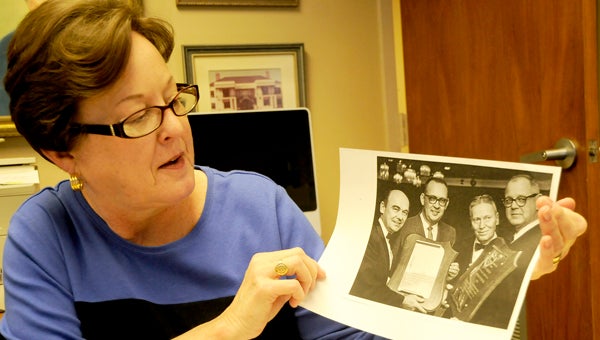Hall of Honor welcomes Falkenberry
Published 11:05 pm Friday, January 25, 2013

Reminiscing: Anne Knight, the daughter of former Times-Journal editor and publisher Rosewell Falkenberry, looks over a picture of her father, who is in the photographs far right, after he was presented the Outstanding Daily Journalist by the Alabama Press Association in 1966. Top, Falkenberry, far left, is pictured with other Times-Journal co-workers on his first day at work at the newspaper. --Ashley Johnson
People say there are some who have ink running through their blood; black ink coursing through their veins. Daughter of former editor and publisher of The Selma Times-Journal, Anne Knight, said her father certainly fit that bill.
“He just loved the newspaper business,” she said, reminiscing about the Times-Journal at a time when the newsroom was loud with typewriters.
Saturday, the children of the late Roswell Falkenberry will be in attendance of the Alabama Press Association’s induction of Falkenberry into the Hall of Honor at Auburn University.
Falkenberry is being recognized for his distinguished 40-year career in journalism, which included leading the Times-Journal during the tumultuous civil rights era in Selma.
Faulkenberry was a man who never drank, although he did have two cups of coffee every day at the Selma Del, a café in Selma.
Knight remembers that though he would meet friends each day for years at the Selma Del, during a few months in 1965, he caught some odd looks.
“He would still walk down Broad Street and have coffee and he said he could see people actually crossing the street to not have to speak to him,” Knight said, recalling how many in the established Selma community did not agree with the Times-Journal’s attempt at providing balanced coverage of the civil right struggles that Selma became famous for in the mid-60s.
He had been through the Battle of the Bulge in Germany and when the prison camps were liberated in Buchenwald, Falkenberry was there as a witness. It was there, Knight said, that he learned about inhumanity — a lesson he took with him to lead the Times-Journal in its civil rights coverage.
“I knew that was something that affected his view on justice and man’s inhumanity to other men and, that, I think must have been why when all of this happened, he said he was going to do the right thing,” Knight said.
Knight recalled during some troubling months in 1965, her father remained happy despite threatening calls, hate mail and a burning cross that showed up one Sunday in the front yard.
“I knew they were under a lot of stress, but I think my dad just took it one day at a time. I don’t think he took any of the threats seriously, but I think he was aware that there were some people who wouldn’t mind doing him bodily harm,” Knight said. “My daddy really did not see himself as a hero, he was just a plain everyday working man and this was sort of just thrust on him.
“He did what he thought was right, but he just saw himself as doing his job,” Knight said. “He was so positive during that period of time I don’t know if he was ever afraid. He didn’t show it.”
Falkenberry was a man who loved Selma and was its biggest advocate when the town was ripped apart, and for that fact, Knight said, was why he reported the civil rights events in the way that he did.
Through his years at an assisted living home in Birmingham, each day he told Knight he just wanted to go home.
He died in his own home on Lapsley Street in 2004, gazing out of the window at a spot where he used to meet his best friend and walk to school.
“To him, there was just this thing about Selma being the greatest place on earth and the people being the greatest people. He just loved Selma, Ala.,” Knight said.




